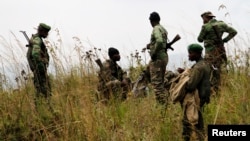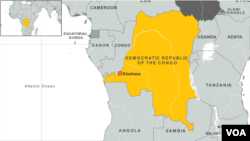Relations between the DRC and Rwanda took a turn for the worse on June 11 when Congolese and Rwandan troops clashed at the border near Goma. After several hours of firefights, the dead bodies of five Congolese soldiers were found by the Red Cross just inside Rwanda.
There had been hardly any open hostilities between Rwandan and DRC forces for several years before this incident. Although calm was quickly restored, trade between the two countries appeared to be threatened when a couple of weeks later the DRC immigration service in Goma announced it would begin imposing visa fees on all Rwandans doing business in Congo, and on students who commute there.
Tens of thousands of Rwandans regularly cross the border between the towns of Gisenyi and Goma, most of them transporting produce.
A number of these traders are disabled and would have difficulty finding work other than pedaling carts across the frontier.
Jean Baptiste Nyamulinda is one of these disabled traders. Speaking to VOA before the visa plan had been dropped, he said he had been told he would have to pay $50 for a three-month visa. He had not heard that disabled people would be exempt and was hoping God would help them.
Several other traders told VOA they would not be able to afford visas, which they had been told would be $50 for three months for informal traders, $30 a year for students and $250 a month for salaried people living and working in Goma.
However, the threat of trade visas now appears to have been lifted after some outside intervention.
A regional body, the Economic Community of Great Lakes Countries, wrote to DRC authorities asking for clarification and pointing out that the visa plan was in breach of a regional agreement on free movement of goods and people.
Economic community official Joseph Lititiyo told VOA Thursday that the DRC's Foreign Ministry has clarified its position.
He said the DRC's response was to point out that other member states - namely Rwanda and Burundi - require Congolese citizens living in those countries to pay for a long stay visa, which is why the DRC has decided to apply the same measure.
Officials in Goma said this week that this fee does not apply to cross border traders, who visit Congo on a daily basis.
Lititiyo said the parties will come together to sort out concerns. He said the DRC government has asked the community to organize a meeting of officials from the three countries to clear up any misunderstandings about the DRC's visa plans.
This is only one of the border disputes between the DRC and Rwanda and by no means the most serious. But its successful resolution could signal a thaw in their relations overall.
Goma-based analyst Timo Mueller who works for the U.S.-based NGO, The Enough Project, says DRC-Rwanda relations reached a dangerously low point with the cross-border fighting in June.
"The military escalation led to a diplomatic quarrel between the two countries, with Rwanda threatening to withdraw from an earlier peace agreement, a regional agreement signed in February 2013. Luckily it hasn't done so, but I think we should take this threat seriously," said Mueller.
The biggest bilateral issue is that Kigali insists that so long as the Rwandan rebel group in eastern Congo, the FDLR, is not disarmed, it poses a direct threat to Rwanda.
A U.N. group of experts on the Congo reported last week that about 200 of the estimated 1,500 FDLR fighters have been demobilized since the start of this year.
The DRC government said it was giving the FDLR another six months to lay down their arms. The concern is that the demobilization will stall.
Resource-rich eastern Congo has long been prone to conflict, attracting regional and ethnic militias for years. U.N. forces have been active in routing out these groups during the last year - in an effort to bring some stability to the region.





